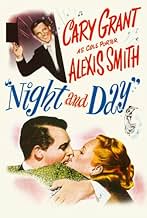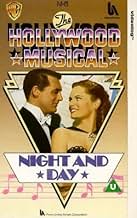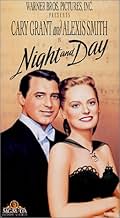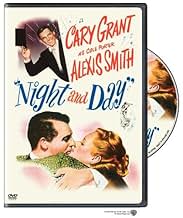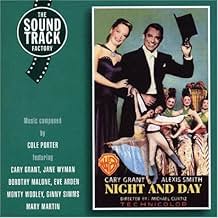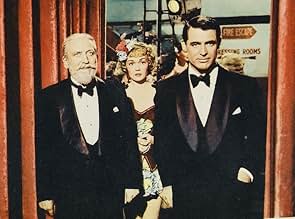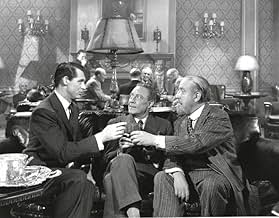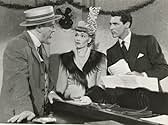AVALIAÇÃO DA IMDb
6,1/10
3,3 mil
SUA AVALIAÇÃO
Adicionar um enredo no seu idiomaA fictionalized biopic of composer Cole Porter from his days at Yale in the 1910s through the height of his success to the 1940s.A fictionalized biopic of composer Cole Porter from his days at Yale in the 1910s through the height of his success to the 1940s.A fictionalized biopic of composer Cole Porter from his days at Yale in the 1910s through the height of his success to the 1940s.
- Indicado a 1 Oscar
- 1 indicação no total
Enredo
Você sabia?
- CuriosidadesAfter attending the premiere of the film, Cole Porter supposedly remarked to his wife, Linda, "if I could survive that, I can survive anything."
- Erros de gravaçãoWhen in England, there are street performers singing "Rosalie". The accordion player's hands never press the keys; in fact, his right hand is static throughout the whole scene.
- Citações
Monty Woolley: Haven't you ever wanted to be alone?
Gracie Harris: Yes, but with somebody.
- ConexõesEdited from Não Me Encerrem (1945)
- Trilhas sonorasNight and Day
(1932) (uncredited)
Written by Cole Porter
Played during the opening credits and often in the score
Sung by Bill Days
Reprised by passengers on a train
Avaliação em destaque
I haven't seen DE LOVELY, the new musical biopic about Cole Porter's life -- the movie trailer convinced me it would be as terrible as the reviews say it is. But Stephen Holden's pan in the N.Y. Times caused me to want to see NIGHT AND DAY again since he thought that for all its fraudulence, it caught something right about Porter's life and times. Having seen it recently for the first time since childhood, I can see what he meant. Evidently everything in it is a lie. Okay. Standard for Hollywood biopics.
The more important thing it gets wrong is the music, which for the most part is not handled well. In this period, Warner Bros. did not have talented singer/dancers under contract and it shows here. Ginny Simms is an accomplished if mechanical singer, Jane Wyman a passable one, but neither dances and neither dazzles. Mary Martin had talent and charm but not the looks nor the sparkle to come across well on film. When dancing is called for we get dull, pretentious ballroom/acrobatic routines from anonymous performers. This film needed the kind of musical talent MGM had under contract, and that lack of talent and zip makes for a musically mediocre film despite the fantastic Porter song catalog.
What the film got weirdly right was the casting of Cary Grant because either by his choice or director Michael Curtiz's design, Grant's withholding, enigmatic performance is intriguing, and does most of the work of spelling out 'the gay thing' for audiences in the know then and now. DE LOVELY may well be frank about the fact that Porter was gay, but gay audiences would have gotten the point in NIGHT AND DAY anyway. Lovely, elegant, chilly Alexis Smith does all the pursuing in the film, as do the other women, and yet Cole is charmingly evasive with all of them. They want him -- who wouldn't want to sleep with Cary Grant at the peak of his beauty? -- but he doesn't seem to care about anything but his music. Hmmmm. Where have we heard that before? Even when Linda/Alexis lands him, he's never really hers, he always seems to have his mind and heart elsewhere. There is absolutely no suggestion anywhere in this film that there was intense passion, emotion or love on his side of this relationship, which is unusual in this period. Rather their marriage seems to be a companionable one of mutual respect, which was apparently the case in real life. When Linda/Alexis gets fed up with being neglected in favor of Cole's work, we can also imagine that an endless supply of bellmen, sailors and chorus boys may have had something to do with it as well. The movie can't say this, but it leaves enough space and question marks for the audience to fill in the blanks. And we do.
Even at the end, with Porter being honored back at Yale with the (all male) glee club singing the glorious "Night and Day" and Linda walks in and she and Cole meet again on the brick patio in the moonlight, Grant doesn't kiss her except for a chaste peck on the cheek. Once again, as throughout the film, he is the passive object of her desire and he hardly seems to care. This performance as much as his work in the excellent NOTORIOUS suggests the coldness and misogyny that sometimes lurk in his screen persona. It's explicit in SUSPICION and NOTORIOUS, Hitchcock was exploring it there, but it's actually implicit in NIGHT AND DAY in every closeup where Grant looks simultaneously gorgeous and conflicted. How hard it must have been to be this beautiful and this uneasy about it.
I concur with those here who find the print currently on view on TCM as sub-par. A new DVD is out on NIGHT AND DAY and TCM would do well to show this in future. Meanwhile, feel free to check this picture out to see an example of screenwriters, a director and a star who work hard to suggest what they cannot actually say.
The more important thing it gets wrong is the music, which for the most part is not handled well. In this period, Warner Bros. did not have talented singer/dancers under contract and it shows here. Ginny Simms is an accomplished if mechanical singer, Jane Wyman a passable one, but neither dances and neither dazzles. Mary Martin had talent and charm but not the looks nor the sparkle to come across well on film. When dancing is called for we get dull, pretentious ballroom/acrobatic routines from anonymous performers. This film needed the kind of musical talent MGM had under contract, and that lack of talent and zip makes for a musically mediocre film despite the fantastic Porter song catalog.
What the film got weirdly right was the casting of Cary Grant because either by his choice or director Michael Curtiz's design, Grant's withholding, enigmatic performance is intriguing, and does most of the work of spelling out 'the gay thing' for audiences in the know then and now. DE LOVELY may well be frank about the fact that Porter was gay, but gay audiences would have gotten the point in NIGHT AND DAY anyway. Lovely, elegant, chilly Alexis Smith does all the pursuing in the film, as do the other women, and yet Cole is charmingly evasive with all of them. They want him -- who wouldn't want to sleep with Cary Grant at the peak of his beauty? -- but he doesn't seem to care about anything but his music. Hmmmm. Where have we heard that before? Even when Linda/Alexis lands him, he's never really hers, he always seems to have his mind and heart elsewhere. There is absolutely no suggestion anywhere in this film that there was intense passion, emotion or love on his side of this relationship, which is unusual in this period. Rather their marriage seems to be a companionable one of mutual respect, which was apparently the case in real life. When Linda/Alexis gets fed up with being neglected in favor of Cole's work, we can also imagine that an endless supply of bellmen, sailors and chorus boys may have had something to do with it as well. The movie can't say this, but it leaves enough space and question marks for the audience to fill in the blanks. And we do.
Even at the end, with Porter being honored back at Yale with the (all male) glee club singing the glorious "Night and Day" and Linda walks in and she and Cole meet again on the brick patio in the moonlight, Grant doesn't kiss her except for a chaste peck on the cheek. Once again, as throughout the film, he is the passive object of her desire and he hardly seems to care. This performance as much as his work in the excellent NOTORIOUS suggests the coldness and misogyny that sometimes lurk in his screen persona. It's explicit in SUSPICION and NOTORIOUS, Hitchcock was exploring it there, but it's actually implicit in NIGHT AND DAY in every closeup where Grant looks simultaneously gorgeous and conflicted. How hard it must have been to be this beautiful and this uneasy about it.
I concur with those here who find the print currently on view on TCM as sub-par. A new DVD is out on NIGHT AND DAY and TCM would do well to show this in future. Meanwhile, feel free to check this picture out to see an example of screenwriters, a director and a star who work hard to suggest what they cannot actually say.
- tjonasgreen
- 7 de jul. de 2004
- Link permanente
Principais escolhas
Faça login para avaliar e ver a lista de recomendações personalizadas
- How long is Night and Day?Fornecido pela Alexa
Detalhes
- Data de lançamento
- País de origem
- Idioma
- Também conhecido como
- Night and Day
- Locações de filme
- Empresa de produção
- Consulte mais créditos da empresa na IMDbPro
Bilheteria
- Orçamento
- US$ 4.445.000 (estimativa)
- Tempo de duração2 horas 8 minutos
- Proporção
- 1.37 : 1
Contribua para esta página
Sugerir uma alteração ou adicionar conteúdo ausente

Principal brecha
By what name was Canção Inesquecível (1946) officially released in India in English?
Responda

